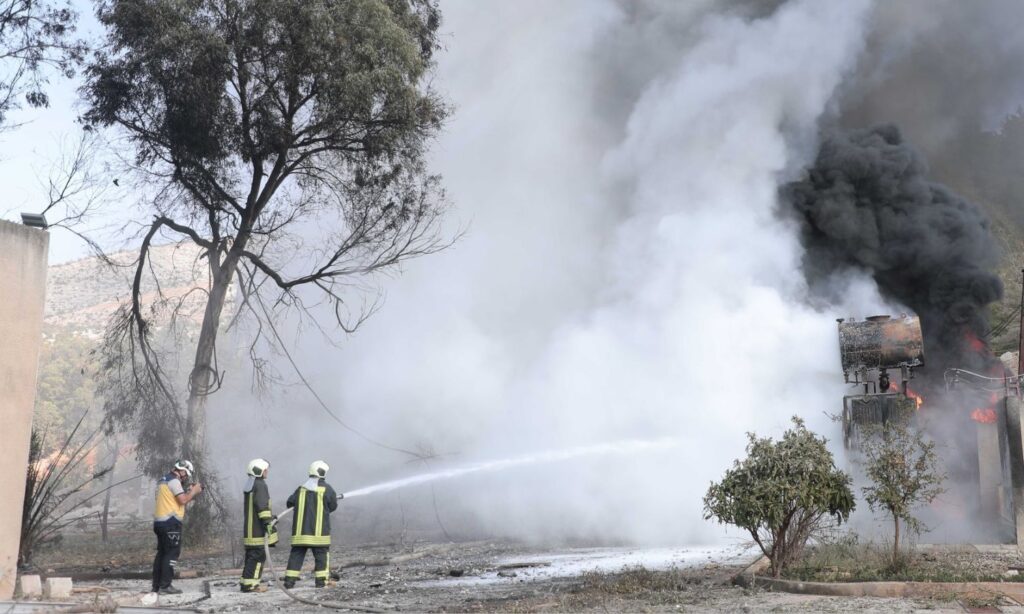The Syrian Network for Human Rights (SNHR) issued a report documenting the responsibility of the Russian army for the deaths of 11 civilians and the destruction of a power station in Idlib, depriving thousands of civilians of water.
The report, released by the SNHR today, Wednesday, October 23, highlights the military escalation of the Syrian-Russian alliance, targeting installations and civilian areas in northwestern Syria.
According to the 16-page report, northwestern Syria witnessed “intense” escalation between October 14 and 16, manifesting in daily Russian airstrikes using jets and high-explosive missiles.
These attacks coincided with ground assaults by regime forces, utilizing artillery and drone strikes laden with explosives (suicide drones).
The SNHR documented the deaths of 13 civilians, including five children, in addition to injuring around 42 others with varying degrees of severity, while the attacks caused extensive destruction to homes and civilian facilities, according to the report.
The SNHR stated in its report that on the evening of October 16, Russian warplanes of the “Su-34” type carried out two airstrikes using no less than four missiles.
The airstrikes targeted agricultural lands along the Ain Sheib road on the western outskirts of Idlib city, specifically a workshop for furniture manufacturing, where dozens of civilians were working.
The attack resulted in the deaths of 11 civilians, including four children, and injured around 31 others with varying degrees of severity, including children as well. The shelling also caused significant destruction to the workshop building and surrounding areas.
The workshop itself had previously been attacked by Russian airstrikes on February 29, resulting in the death of one civilian and the injury of five others, according to the report.
On October 15, Russian aircraft of the “Su-34” type targeted the Kilani electricity transformer station in the Ain al-Zarqa region in western Idlib with three missiles (in two stages), resulting in the injury of two workers at the station with minor injuries, the destruction of two main transformers, a fire breaking out in the area, and the destruction of electricity towers and cables.
According to the report, the control room and main breakers also suffered destruction, alongside significant damage inflicted on the building and the surrounding wall.
The Kilani station is considered a primary source for feeding the Ain al-Zarqa station responsible for water supply, leading to power and water outages affecting thousands of civilians.
In addition to the above, the irrigation supply to agricultural lands in the al-Rouj Plain stopped, significantly impacting local residents and their agricultural lands, according to the report.
The indiscriminate attacks by regime forces continued since the beginning of this year, according to the SNHR, particularly using “suicide drones,” while the Russian attacks were characterized by being “surprising and relatively sporadic.”
Throughout the repeated attacks during the current year, the SNHR documented the deaths of 54 civilians, including 19 children and seven women, due to attacks by Russia and the regime on northwestern Syria.
UN warns
On October 17, following a wave of military escalation in the region, the United Nations warned about the risks of military escalation by regime and Russian forces in northwestern Syria, confirming that it led to the cessation of humanitarian activities and the disruption of health facilities.
This statement was made by David Carden, the Deputy Regional Humanitarian Coordinator for the Syrian crisis, who expressed “grave concern” over the escalation of hostilities and violence in northwestern Syria.
Carden stated that at least 122 attacks occurred during three days, 115 of which struck Idlib and western Aleppo, including residential areas, local shops, and agricultural land.
He added that among those attacks, the first series of Russian airstrikes occurred after a three-month hiatus, with three airstrikes hitting an area near a camp west of Idlib at a time when families were receiving food aid.
The next day, two airstrikes targeted an electricity station in western Idlib, causing disruption to two water stations that served 30,000 people in 17 villages.
The UN official noted that during the same period, reports emerged of artillery shelling and clashes in northern Aleppo, affecting schools and displaced persons’ camps.
The Russian escalation came after a calm period of more than three months, as the last Russian airstrike in the area occurred on July 10, which targeted the vicinity of the village of Hamama in the rural area of Jisr al-Shughour in western Idlib with vacuum missiles.











